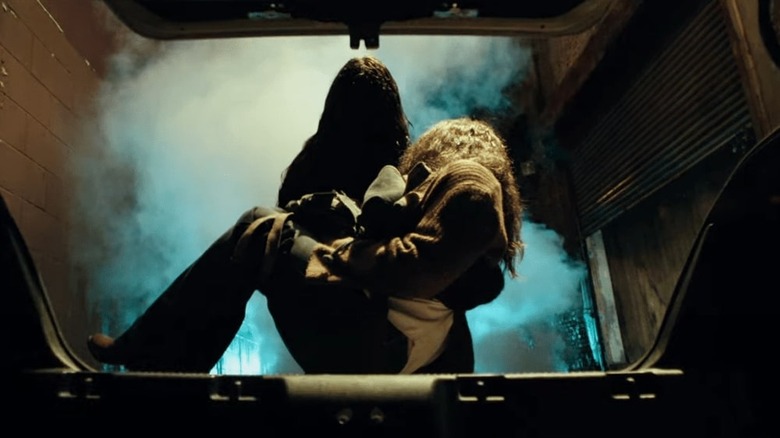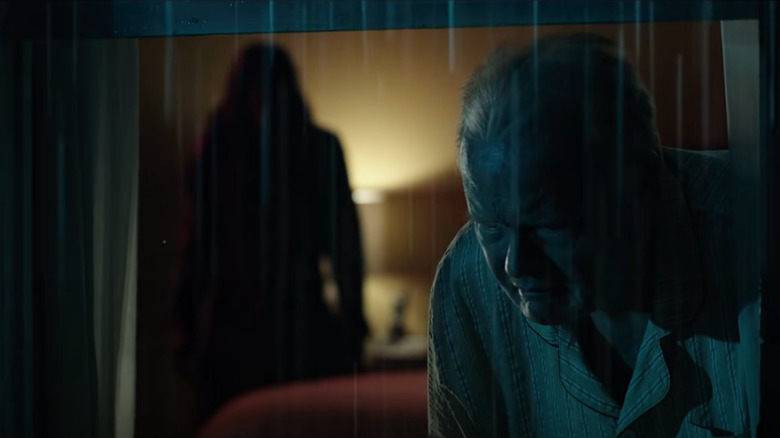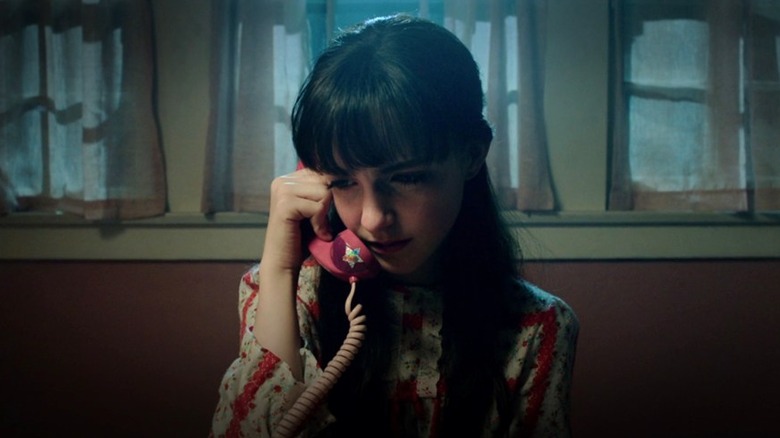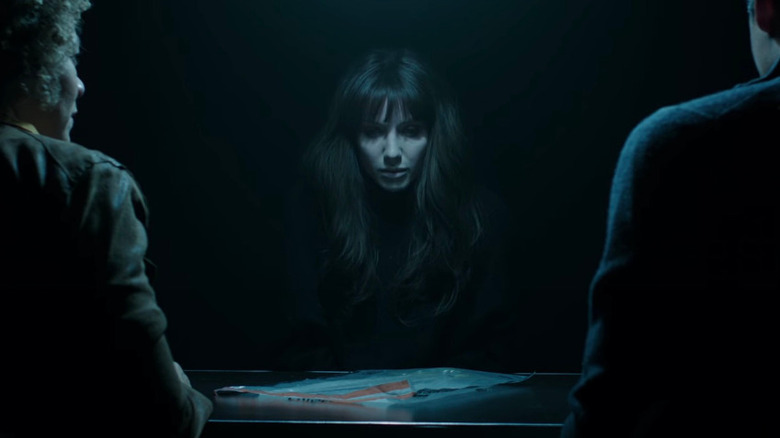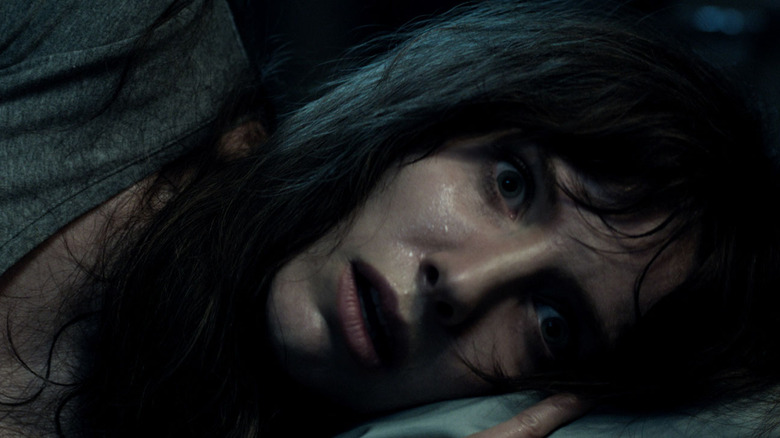Malignant Ending Explained
After being bumped back a year from its original 2020 release date due to the COVID-19 pandemic, horror king James Wan's grisly paranormal thriller "Malignant" finally premiered simultaneously in theaters and on HBO Max in September of 2021. "Malignant" stars Annabelle Wallis as Madison Mitchell, a woman who suddenly starts experiencing terrifying visions of horrific murders. It doesn't take long for her to realize that the murders she's witnessing are actually happening, with her visions of them occurring in real time.
Soon, repressed memories of Madison's childhood begin to float to the surface, and she realizes that her experiences as a child may somehow be linked to the current string of violence. But as Madison digs for the truth in the present, she only gets drawn deeper into the nightmarish reality of her past, until "Malignant" culminates in a mind-blowing third act that leaves the characters in the film — those who survive it, at least — just as stunned as the audience. So if you had trouble wrapping your brain around the film's final twists, here's the ending of "Malignant" explained.
[SPOILER WARNING for the ending of "Malignant"!]
Who was Gabriel?
After spending most of the film under the impression that Gabriel was either psychically connected to Madison, or possibly even a supernatural entity that only she could see, the ending of "Malignant" reveals the shocking truth: Gabriel is actually Madison's parasitic twin, who was born attached to the back of her body. In the womb, as Madison (named Emily for the first few years of her life) developed normally, she partially absorbed the underdeveloped Gabriel. However, they were born with both twins conscious, even though Gabriel did not have a usable body of his own, with severely underdeveloped limbs and both twins sharing the same brain, making him entirely physically reliant on Madison.
Though Madison and Gabriel shared a brain, they used it very differently. Their consciousnesses were mostly separate, and the malevolent Gabriel would attempt to manipulate Madison to try to convince her to carry out malicious acts. After being turned over to a research hospital by their teenage mother, the decision was eventually made to surgically remove Gabriel from Madison once the doctors determined he could not be rehabilitated. However, although they removed Gabriel's body, they had to leave his brain intact, since he shared it with Madison. That part of Gabriel remained mostly dormant until he was reawakened many years later.
Is a person like Gabriel actually possible?
The short answer is "yes and no." While craniopagus parasiticus is a real condition, in which an underdeveloped parasitic twin is attached by the head to a developed twin, the underdeveloped twin has never been known to be conscious. Of course, the condition is extremely rare, with only four to six cases occurring in 10 million births, leaving only a very small sampling throughout history to draw conclusions from. So while it is indeed possible that a baby might be born with a body similar to Gabriel's attached to her back, the likelihood of the parasitic twin actually being able to think and act like Gabriel is exceedingly small, if not entirely impossible.
Additionally, although there have been several attempts in the 21st century to surgically remove the parasitic twin in cases of craniopagus parasiticus, those children have never lived for very long, with the most successful procedure still only extending the developed twin's life for another year. So the odds of Madison being able to survive with Gabriel until the age of seven, and then continue to survive with no complications into adulthood, are minuscule at best.
What were Gabriel's powers?
As seen through glimpses in the opening credits, Gabriel had the ability to manipulate and control electricity, and to use electronic speakers to project his voice, even though he physically couldn't speak. He also possesses superhuman strength. How he got those powers is never explained, although it's possible that it's based on the myth that humans could develop superpowers if we were able to access 100 percent of our brain function, rather than the purported 10 percent that most humans actually use. With Gabriel accessing one part of the brain and Madison accessing the rest, maybe that heightened brain function is supposed to be what gives him his extraordinary abilities.
However, although it presents a cool premise for movies, the 100 percent brain myth has been thoroughly debunked. The truth is, we already do use pretty much all of our brains, leaving pretty much zero untapped potential for superpowers. But considering the rest of "Malignant," we doubt that the film is particularly concerned with real science, making Gabriel's enhanced use of Madison's brain the most likely explanation for what he can do.
What made Gabriel go away?
Although Dr. Florence Weaver (Jacqueline McKenzie) hoped that the surgery to remove Gabriel's body from Madison's when she was a child would banish his evil consciousness forever, that didn't turn out to be the case. Madison continued to hear Gabriel's voice even after being adopted by her new family. When her adopted mother Jeanne (Susanna Thompson) became pregnant, Gabriel felt threatened by the new baby, worrying that if Madison had a new sibling, she would no longer need him. So he manipulated Madison, trying to convince her to kill her baby sister. However, Madison was able to resist him in order to keep the baby safe.
As Madison's bond with her sister Sydney (Maddie Hasson) grew stronger, she was able to finally suppress Gabriel, banishing him to the back corners of her mind and snuffing out her memories of him. This enabled Madison to have a mostly normal life, strengthened by her strong ties to her family to subconsciously keep Gabriel mostly at bay.
Why did Gabriel return?
At the beginning of "Malignant," a pregnant Madison is experiencing abdominal pain, and worries that something may be wrong with the baby. Through a conversation with her husband Derek (Jake Abel), we learn that this isn't Madison's first pregnancy, but all of her prior pregnancies have ended in miscarriage. The two fight, and Derek throws Madison against the wall, hitting the back of her head hard.
We later learn that Madison's miscarriages were actually Gabriel, feeding off her babies to gain strength. When Madison's head hits the wall, the impact is enough to finally jostle Gabriel back to full consciousness. Once he's awake, he immediately begins executing his plan to exact revenge on everyone he believes has wronged him and Madison, beginning with Derek. After killing Derek, he then moves on to the doctors who removed his body from Madison's at the research facility, intending for his plan to culminate in the murders of his birth mother and Madison's adopted family.
What was really happening to Madison during Gabriel's attacks?
For most of "Malignant," it appears as though Madison is nowhere near Gabriel's murders as he commits them. She believes she is receiving psychic visions of Gabriel's attacks, which allow her to watch what is happening but not intervene. Madison's physical separation from the murders seems to be confirmed when Detective Kekoa Shaw (George Young) figures out the pattern of Gabriel's attacks and arrives at a murder scene immediately after Gabriel has slaughtered his next victim. Having not yet left the apartment, Gabriel attacks Shaw, giving Shaw a glimpse of his malformed face. This seems to prove that Madison and Gabriel are separate people.
But in the final act of the film, the horrifying truth is revealed: Gabriel is actually using Madison's body to carry out his attacks, pushing his face through a hole in the back of her skull and contorting her limbs so the back of her body functions as the front of his. Whenever Gabriel takes over her body, he also takes over her brain, giving her the illusion of being in a separate location the whole time. In reality, Madison is always physically present at the murders, but unconscious, with her mind being manipulated by Gabriel to keep her from understanding how he's using her body.
How did Gabriel call the police?
When Detectives Shaw and Regina Moss (Michole Briana White) finally can't ignore the growing pile of evidence that Madison is at least closely related to the recent string of killings, if not the perpetrator, they bring her into the police station and question her in an interrogation room. While Madison is insisting on her innocence, Shaw's phone rings with a call from an unknown number. Shaw puts the call on speaker, and it is Gabriel's voice, speaking to the detectives while Madison sits wordlessly across from them.
It seems to prove that Gabriel and Madison can't be the same person, but he's actually cleverly using his extraordinary abilities to throw them off the track. Through his manipulation of electricity, he's able to control Shaw's phone, and then he uses the speaker to create his voice, as we've seen him do many times before. It's an ingenious way to attempt to prove Madison's innocence, but unfortunately, the detectives still don't trust her enough to release her. Instead, they put her in a holding cell with a number of women being held for booking while they try to get to the bottom of Gabriel's identity, which proves to be a grave mistake.
What did Madison do to Gabriel?
At the end of "Malignant," it appears that Gabriel has finally won, overpowering Madison yet again to break into their biological mother's hospital room, and using Madison's body to kill both their mother and Madison's sister, Sydney. Before she dies, though, Sydney tells Madison the truth: that Gabriel was the one responsible for her many miscarriages, and begs her to wake up and overpower him. While Madison seems to be fighting her Gabriel-induced paralysis, she's too late, and Gabriel completes his kills.
However, moments later, it becomes clear that this time, the scene we just saw was from Gabriel's point of view, not Madison's, and that Madison has turned his own tricks against him. Just as he had tricked her into thinking she was safe at home when her body was in a totally different part of town committing gruesome murders, Madison tricked him into believing he was killing Sydney and his mother. In reality, she had finally gained the mental strength to take back control of her body and stay his hand. She then confronted Gabriel inside her mind, locking him in a mental cage so he couldn't take her over anymore.
Is Gabriel really gone?
Unfortunately, the problem that existed at the beginning of "Malignant" still remains: since Gabriel and Madison share a brain, there is no way to completely remove Gabriel without killing Madison. Therefore, although Madison can trap him — as she successfully did for most of her life, prior to the events of the film — she can't get rid of him entirely. He's always there, occupying some part of her brain. She even acknowledges this in the end, when Gabriel taunts her that she won't be able to keep him locked up forever, and she agrees.
However, this time Madison is an adult, not a child, and has no intention of burying what she knows deep in her subconscious again. This time, she tells Gabriel, she will be ready for him when he inevitably eventually breaks out. It seems reasonable to assume that now that Madison knows the truth, she will work on building up her mental resources so he won't be able to take her over again. Of course, it's also highly likely that she'll be doing that from inside a prison cell, since even though we all know that mentally she was innocent of Gabriel's murders, the police aren't likely to let her physical body off the hook.
What is the meaning of the title?
At the beginning of the film, Dr. Weaver ominously says that it's time to "cut out the cancer" from Gabriel, although what she means by that is left unclear. When Gabriel returns, he repeats this line many times, making it clear that he is extremely upset by it. By the end of the film, it becomes clear that the "cancer" that Dr. Weaver was referring to at the beginning of the film was Gabriel himself, and that what she cut out was his physical body.
Referring to Gabriel as a cancer is an apt description, since cancer occurs when the body's own cells begin to grow uncontrollably. When those cells are malignant, it means they are invading and destroying healthy tissue before spreading to other parts of the body. This is extremely similar to what Gabriel has done to Madison, feeding off her healthy body to strengthen himself, and gaining strength from consuming her children. Much like in the treatment of many cancers, the surgery Madison undergoes at the beginning of the film could not remove all of the "cancer" of her brother, and the doctors simply have to hope they removed enough of it to come back. Unfortunately, they were wrong: Gabriel is a type of malignancy that can't be cured, meaning the best Madison can do is learn to live with him.

